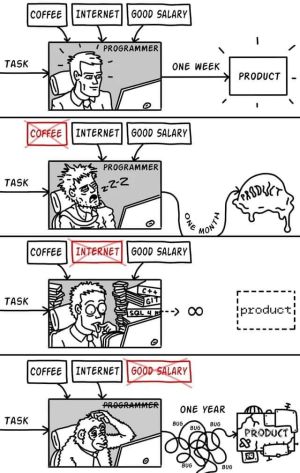Programmer
Programmer: A living organism that turns caffeine into code
A programmer, also known as a software developer or software engineer, is a skilled professional who specializes in designing, coding, testing, and maintaining computer programs and software applications. Their primary role revolves around creating efficient and functional programs that address specific needs and solve real-world problems.
Roles and Responsibilities
- Designing: Programmers work closely with stakeholders and other team members to understand project requirements. They create comprehensive designs and blueprints for software applications, outlining the architecture, flow, and functionality.
- Coding: Programmers are proficient in various programming languages such as Python, Java, C++, and JavaScript. They write clean, efficient, and maintainable code to implement the software design and ensure it performs the desired tasks accurately.
- Testing: Thorough testing is a crucial aspect of a programmer's role. They conduct rigorous testing to identify and fix bugs, errors, and issues in the software. This includes unit testing, integration testing, and user acceptance testing to ensure the program functions as intended.
- Debugging and Troubleshooting: When issues arise, programmers are responsible for diagnosing and resolving software defects. They use various debugging techniques and tools to trace and fix errors, improving the overall performance and stability of the application.
- Maintenance: After the software is deployed, programmers continue to maintain and update it. They monitor its performance, address any emerging issues, and implement enhancements or new features to keep the software relevant and up-to-date.
- Collaboration: Programmers often work as part of a larger team, collaborating with other developers, designers, and stakeholders to bring projects to fruition. Effective communication and teamwork are crucial for successful software development.
- Documentation: Programmers document their code and software processes thoroughly. This documentation aids in understanding the software's functionality, facilitating future updates, and assisting other developers who may work on the project.
- Keeping Up with Technology: As technology evolves rapidly, programmers stay up-to-date with the latest trends, frameworks, and tools in the software development industry. Continuous learning is essential to remain proficient and innovative in their work.
- Problem-Solving: Programmers possess strong problem-solving skills. They tackle complex challenges, devise creative solutions, and find efficient ways to optimize software performance.
- Security: Security is a paramount concern for programmers. They implement best practices and techniques to protect software and data from vulnerabilities and cyber threats.
In essence, programmers are the masterminds behind the software that powers our digital world. Their expertise, ingenuity, and dedication play a vital role in shaping the technology that drives modern society forward.
Programmers as First Responders
Programmers as Tech Multi-tools: Firefighters, Builders, and Everything in Between
In many companies, especially smaller ones, the lines blur between traditional programming and IT functions. Programmers find themselves wearing multiple hats, from writing elegant code to putting out proverbial system fires and rebuilding digital infrastructure in the aftermath.
Fire Department: Emergency Response
When the database crashes, the network malfunctions, or a critical software bug rears its ugly head, programmers are often the first on the scene. They have the technical know-how to diagnose the problem quickly, triage the crisis and implement emergency fixes to restore critical functionality. Like firefighters rushing into a burning building, they must act decisively under pressure to minimize business disruption.
Construction Crew: Rebuilding from the Ashes
Once the flames are doused, the programmer's work is far from over. Their construction worker side kicks in. They must meticulously reconstruct damaged systems, often relying on blueprints (backups, snapshots) to get things back to their original state. They have to identify the root cause of the issue to prevent it from blazing up again.
The Unique Challenges of the Hybrid Role
This chaotic blend of firefighting and rebuilding can be both thrilling and exhausting. Programmers thrive on problem-solving, but constant emergencies can disrupt long-term development projects. The need to shift gears from deep strategic coding to immediate crisis resolution demands a unique kind of mental agility.
The Rewards of Being a Tech Multi-Tool
Despite the challenges, the programmer/IT hybrid role offers immense rewards. These individuals gain an unmatched breadth of knowledge about the company's entire technology stack. Their troubleshooting skills become legendary, and the sense of saving the day is quite addictive.
Advice for Thriving in this Role
If you find yourself in this dynamic role, here's some advice:
- Embrace the chaos: Expect the unexpected, and be prepared for interruptions.
- Document everything: Detailed notes during crises become lifesavers for future reference.
- Advocate for proactive maintenance: Emphasizing preventative measures to reduce future "fires."
In today's world of lean, tech-driven companies, programmers who double as IT heroes are invaluable assets. They are the multi-tools of the digital age - firefighters, builders, and problem-solvers all rolled into one.
Programmer in Small companies: เป็ด
The Life of a Programmer in a Small Company: Master of All Trades, Hacker of None
How, the life of a programmer in a smaller company? It is a really fascinating and diverse role it is. While others might believe that programmers spend their days coding away in dimly lit rooms, the reality is far more exciting. In these establishments, programmers are not just code wizards; they are also the go-to experts for all things unrelated to their actual job.
Picture this: you are a skilled programmer with years of coding expertise, and you find yourself being called upon to fix the office printer. Yes, you heard that right! Apparently, your ability to debug code qualifies you as the savior of malfunctioning inkjets. Who knew that years of learning programming languages could also lead to deciphering cryptic printer error messages?
But wait, it doesn't end there! Your talents are sought for replacing lightbulbs, fixing coffee machines, and even unclogging the office toilets. Who knew that mastering C++ could translate into unclogging the office plumbing too? Forget about the glamorous world of software development; Maybe one day your Half-Life gameplay skills might be put to good use in crawling through office vents.
Now, let's talk about the hilarious requests that come your way. Oh, the joy of being asked to hack into Facebook accounts! It seems that some folks believe programmers are undercover hackers capable of breaching the world's most secure systems. But let me assure you, we don't have the secret code to Zuckerberg's vault. Unlike Sarkhan's police of course, they have access over every L*NE messages you sent out there.
And what about the notorious "Can you fix my computer?" plea from friends and family? As if we have a magical Ctrl+Alt+Delete spell to revive their dying laptops. Sure, we can debug complex algorithms, but debugging Aunt Sue's laptop from a ransomware is a whole different ballgame.
Let's not forget the occasional request to recover lost files from ancient floppy disks or decipher cryptic Excel macros from the Stone Age. Apparently, programmers are time travelers who can navigate obsolete technologies like it's nobody's business.
Despite the absurdity, we programmers take it all in stride. It's our secret superpower – being the unsung heroes of the office, handling everything from broken coffee machines to data breaches (well, not really).
So, next time you encounter a programmer in a smaller company, spare a thought for their hidden talents. Sure, they may not hack into Facebook or fix every office woe, but their prowess in coding and problem-solving makes them the backbone of the digital world. And if you need help fixing your printer, just remember – there's a programmer for that!
Femboy Programmers

Is it a myth that most femboys are programmers?
Let's debunk this stereotype and get to the bottom of the intriguing connection between femboys and programming. First of all, what is a femboy? A femboy is an individual who embraces both masculine and feminine traits, often expressing themselves in a more feminine manner. They challenge traditional gender norms and are proud of their unique identity.
Now, let's address the link between femboys and programming. The notion that femboys are predominantly programmers may have originated from a playful trend known as 'programming socks' or thigh highs. These fashionable socks gained popularity within certain online communities, including some programming circles. However, it's essential to recognize that fashion choices do not define one's career or interests.
Another factor that might have contributed to this stereotype is the assumption that programmers are introverts. While it's true that some programmers prefer solitary work, it's crucial to avoid generalizations. People with diverse personalities and interests can thrive in the programming world.

Moreover, the proliferation of femboy images online may create an illusion of a higher representation of femboys among programmers. The internet provides a platform for self-expression, and some individuals, including femboys, may feel comfortable sharing their photos online. However, it's important to remember that the online world does not fully reflect reality.
As for the mention of furries being overrepresented among femboy programmers, it's essential to approach this with nuance. Furry culture, which centers around anthropomorphic animal characters, has its own diverse community of participants, including individuals who may also identify as femboys. The association with programmers could be coincidental, and it's essential not to draw hasty conclusions about entire groups of people.
In conclusion, the idea that most femboys are programmers is indeed a myth perpetuated by stereotypes and playful online trends. It's crucial to recognize that people's interests and identities are multi-faceted, and individuals should not be defined solely by their appearance or hobbies. Femboys, like any other group, are a diverse community, and it's essential to treat them with respect and avoid making assumptions based on stereotypes.

